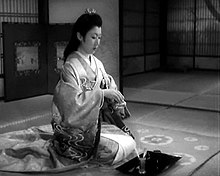The Life of Oharu
| The Life of Oharu | |
|---|---|
 | |
| Directed by | Kenji Mizoguchi |
| Screenplay by |
|
| Based on | The Life of an Amorous Woman by Saikaku Ihara |
| Produced by |
|
| Starring | |
| Cinematography | |
| Edited by | Toshio Gotō |
| Music by | Ichirō Saitō |
Production companies | |
| Distributed by | Shintoho |
Release date |
|
Running time | 148 minutes[1] |
| Country | Japan |
| Language | Japanese |
The Life of Oharu (西鶴一代女, Saikaku Ichidai Onna) is a 1952 Japanese historical fiction film directed by Kenji Mizoguchi from a screenplay by Yoshikata Yoda. It stars Kinuyo Tanaka as Oharu, a one-time concubine of a daimyō (and mother of a later daimyō) who struggles to escape the stigma of having been forced into prostitution by her father.[2][3]
The Life of Oharu is based on various stories from Ihara Saikaku's 1686 work The Life of an Amorous Woman. The film was produced by the Shintoho Company and executive produced by , with cinematography by . The production designer was and was the historical consultant.
It has been claimed that this movie was one of Kenji Mizoguchi's favorite projects, even though it was under-financed.[citation needed]
Plot[]

The story opens on Oharu as an old woman in a temple flashing back through the events of her life. It begins with her love affair with a page, Katsunosuke, the result of which (due to their class difference) is his execution and her family's banishment. Oharu attempts suicide but fails and is sold to be the mistress of Lord Matsudaira with the hope she will bear him a son. She does, but then is sent home with minimal compensation to the dismay of her father, who has worked up quite a debt in the meantime. He sends her to be a courtesan, but there, too, she fails and is again sent home.
Oharu goes to serve the family of a woman who must hide the fact that she is bald from her husband. The woman becomes jealous of Oharu and makes her chop off her hair, but Oharu retaliates, revealing the woman's secret. She again must leave -- this time she marries a fan maker who is killed shortly after during a robbery. She attempts to become a nun, but Oharu is thrown out after being caught naked with a man seeking reimbursement for an unauthorized gift (it is made clear this is rape by Oharu's claims and distraught demeanor). She is thrown out of the temple, becomes a prostitute, but fails even at that. In the end, she is recalled to the Lord's house to be exiled within the compounds to keep her secrets locked away. While being scolded for the life she chose, she attempts to find her son, and in the process, ends up running away as she chooses the life of a wandering nun over the life in exile.
Cast[]



- Kinuyo Tanaka as Oharu – the protagonist whose bad luck and misfortune lead to various struggles in life.
- as Tomo, Oharu's mother – a kind character in the film; her mother tended to side with Oharu and did not wish to see her become a courtesan.
- Ichirō Sugai as Shinzaemon, Oharu's father – Oharu's father was consumed by desire for money and social status. His misjudgments about Oharu caused much of her downfall.
- Toshiro Mifune as Katsunosuke – a page who courted Oharu and they fell into a forbidden love. He is beheaded once their relationship is discovered.
- as Lord Harutaka Matsudaira – he takes Oharu as a mistress in order to bear a child heir. Unfortunately for Oharu, he falls in love with Oharu and his wife's jealousy causes her dismissal.
- as Lady Matsudaira – the wife of Harutaka Matsudaira who, because of her jealousy of her husband's love for Oharu, banishes her.
- Jūkichi Uno as Yakichi Ogiya – he was a respected fan maker who married Oharu, however, he is tragically murdered shortly into their marriage.
- as Landlady
- Eitarō Shindō as Kahe Sasaya
- as Fumikichi, Sasaya's friend.
- as Sodegaki
- Masao Shimizu as Kikuoji
- Daisuke Katō as Tasaburo Hishiya
- as Yoshioka
- as manager Bunkichi
- Haruyo Ichikawa as Lady-in-waiting Iwabashi
- as Otsubone Yoshioka
- Noriko Sengoku as Lady-in-waiting Sakurai
- Sadako Sawamura as Owasa
- as Taisaburo Hishiya
- Eijirō Yanagi as forger
- Chieko Higashiyama as Myokai, the old nun
- Takashi Shimura as old man
- as Jihei
- Komako Hara as Otsubone Kuzui
Awards[]
The Life of Oharu won the International Prize at the 1952 Venice International Film Festival and was nominated to Golden Lion.[4] The film (include 1952 films Himitsu, Inazuma and Okaasan) won 1953 Mainichi Film Concours for best film score (Ichirō Saitō).
References[]
- ^ Jump up to: a b "西鶴一代女". Japanese Movie Database (in Japanese). Retrieved 6 February 2021.
- ^ "西鶴一代女". Agency for Cultural Affairs. Retrieved 27 December 2020.
- ^ "西鶴一代女". Kinema Junpo. Retrieved 27 December 2020.
- ^ "西鶴一代女". kotobank. Retrieved 27 December 2020.
External links[]
| Wikimedia Commons has media related to The Life of Oharu. |
- The Life of Oharu at IMDb
- The Life of Oharu at AllMovie
- 西鶴一代女 (Saikaku Ichidai Onna) at the Japanese Movie Database (in Japanese)
- Comparison of DVD and Blu-ray releases at DVDBeaver.com
- The Life of Oharu: Not Reconciled an essay by Gilberto Perez at the Criterion Collection
- 1952 films
- Japanese-language films
- 1952 drama films
- Japanese black-and-white films
- Films directed by Kenji Mizoguchi
- Japanese films
- Jidaigeki films
- Japanese drama films
- Films about geishas
- Films set in Kyoto
- Films with screenplays by Yoshikata Yoda
- Films scored by Ichirō Saitō
- Films based on Japanese novels
- Films about prostitution in Japan
- Shintoho films